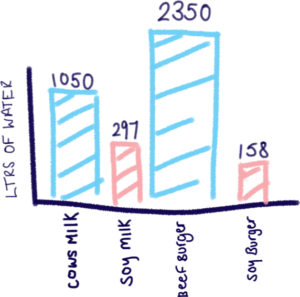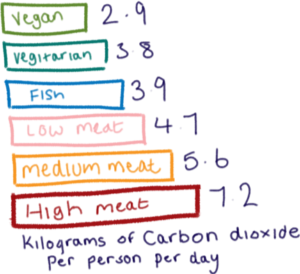What can I do to help the environment?
Helping the environment is a big deal for us, you’d know if you’ve read our previous post on our 2019 resolutions!
You have most likely heard people talking about reducing their dairy and meat consumption. Maybe you’re sick of hearing about vegans. But stick around for a little longer and you might learn something new!
What is veganuary?
Veganuary is a stepping stone into veganism. In brief, you’ll pledge to be vegan for the whole of January. No meat, no dairy, no fish!
Why do it?
For the most part, people go vegan for the ethical impact meat consumption has on animals and the environment. Some want to feel better about themselves and others want a challenge.
 The facts and figures
The facts and figures
Becoming vegan or reducing your consumption a small amount can have a huge impact.
For example, you’ll save water[1]. The production and transport of food require lots of water. Products that don’t use livestock require less water.
- A Loaf bread = 600 litres
- An apple = 70 litres.
You’ll protect nature
Animal agriculture requires a large amount of land to rear animals and to produce food to feed them. 30% of the earth’s surface is used to graze and rear animals. A big issue is palm oil. It’s used to make a whole range of cosmetics, detergents and food products including margarine and ice cream. The demand for palm oil is high therefore has detrimental effects on wildlife and forests.[2]

Reduce your greenhouse gas emissions
Air pollutants are generated through clearing land and growing crops for animals and transport. Scientists at Cornell University found that to produce one calorie of food energy from beef requires 40 calories of fossil fuel energy. In comparison, one calorie of human-edible grain takes 2.2 calories of fossil fuel energy.
Your diet can greatly impact the emissions into the environment which then leads to an impact on our health.
You’ll reduce pollution
The biggest threat to water pollution is from agriculture. Many coastal dead zones populate the UK due to fertiliser, manure and sewage pollution. This causes algal blooms. These decompose and oxygen is sucked out of the water leaving fewer species able to survive.
Eating vegan and you don’t know it
Cutting down on your consumption of certain foods isn’t always bad. For instance, these are just some foods that are accidentally vegan that you’re probably already eating!
- Doritos: Chilli Heatwave and Lightly Salted
- Oreos: Original
- Fox’s: Dark Chocolate Chunkie Cookies, Party Rings
- Co-op Jam, and custard doughnuts
- Bird’s Custard(when made with plant milk)
- Walkers Crisps: Ready Salted, Salt and Vinegar, Pickled Onion, Prawn Cocktail, Worcester Sauce, Crinkles Simply Sea Salted, Chipsticks Salt ‘n’ Vinegar Flavour, Sensations Lime & Coriander Chutney Poppadoms, Sensations Balsamic Vinegar & Caramalised Onion, Sunbites Sweet Chilli, Sunbites Original, Sausage and Brown Sauce
- Pringles: Original, Paprika, BBQ and Smokey Bacon
- Mr Kipling: Treacle Tart, Jam Tarts, Apple and Blackcurrant Pies[3]
In a lifetime, each of us will eat more than 7,000 animals! It’s not about trying to change your whole lifestyle straight away. Small changes can make a big difference for you and the environment!
In short, realistically it would be hard to cut out everything and go cold turkey. However, why not try meat-free Mondays? Or switching up your milk in your coffee (coconut milk is my favourite).
Referances
[1] https://waterfootprint.org/media/downloads/Report49-WaterFootprintSoy.pdf
[2] https://veganuary.com/why/environment/youll-protect-nature/
[3] https://veganuary.com/starter-kit/accidentally-vegan-products-uk/